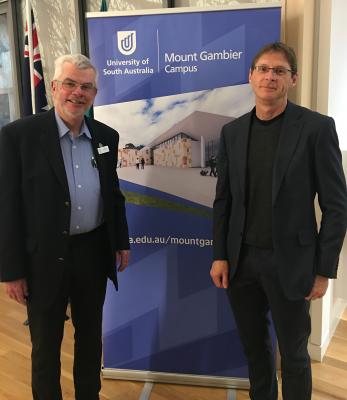
Around 30 people gathered at UniSA’s Mount Gambier campus on Tuesday night to listen to Professor Shane Dawson deliver a free public lecture discussing the future impact of digital learning on schools, businesses and communities.
Prof Dawson said digital learning tools were particularly important in regional communities, such as Mount Gambier, because the technology has the ability to remove existing physical barriers to a quality education.
“Innovations in technology are transforming digital learning, creating immersive access to education in places where it’s not been possible before,” he said.
“Virtual reality environments can bring resources into your living room, allowing you to visit the Louvre, explore the Great Barrier Reef or discover the deep reaches of outer space without leaving your home.
“Technologies can also help regional communities open themselves up to the world, creating new business opportunities and networks for locals.”
The shift to online learning, accelerated by the global pandemic, has demonstrated that we already have a variety of digital learning tools available to us.
But Prof Dawson’s presentation focussed on the role of more advanced technologies, such as artificial intelligence, within future education settings and what they might mean for learning, teaching, and career transitions in the future.
There was a particular emphasis on the need for future workforces to dedicate more time, more often towards upskilling, in order to keep pace with the constantly changing technological landscape.
“The popular catchphrase that we must educate students for jobs that don’t yet exist has been overstated, but realistically most students today will undergo more frequent and more significant transitions in their careers,” Prof Dawson said.
“This will require constant upskilling, reskilling or radical career changes.
“In this landscape, access to education and remote communities of learners will be essential and an educator’s ability to harness technology will be one of the keys to success in this digital learning environment.”
Tuesday’s event was part of the university’s ongoing public lectures series, which is set to continue throughout 2021.







